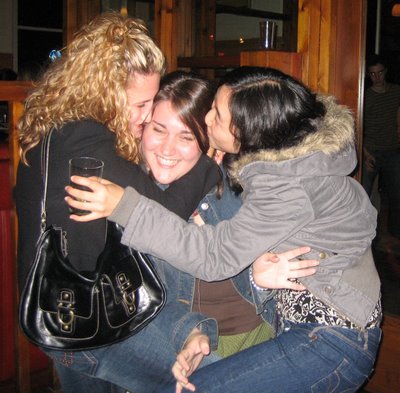[Note: If you're not up-to-date on your Jacobite history, now might be a good time to review the Culloden post a few entries back, else you might get lost. Given time constraints, I'll not be able to recap.]
Glen Coe, a narrow, steep-sided valley near Rannoch Moor, is often referred to as the "glen of weeping" for two reasons: 1) during the rainy months and first spring thaws, runoff cascades down the mountains, creating the illusion of crying hills; and 2) it is home to the village of Glencoe, the site of the most infamous breach of Highland hospitality in Scottish history.

A view of the valley in late September (my first visit), before the fern and heather started to die back.
In 1691, following the unsuccessful Jacobite uprising of 1689-90, William of Orange offered pardons to all Highland clans who had participated in the botched rebellion, provided they swore allegiance to the newly instated monarchy by the first of January, 1692. Those who did not pay fealty to the king, however, would be treated as enemy combatants and suffer grave consequences.

View of a pass through the valley as the sun sets in the distance.
Many of the Highland clans chose to await word from their "true" king--James II, living in exile in France--before proclaiming loyalty to the appointed magistrate. James, upon realizing that the seeds for revolution and his campaign to regain the throne would not ripen before the deadline, granted the chiefs permission to take the oath in mid-December. For the clans who lived in remote areas, such as the MacDonalds of Glencoe, James' authorization came too late; delayed by topography, wintry weather, and misinformation, clan chief Alastair MacDonald arrived in Inverary five days after the deadline. As such, the MacDonalds of Glencoe were not included on the list of clans who had sworn allegiance to the crown.

A view of the same pass through the valley, taken in late October when the fern begins to turn red.
In one of the more vile acts of retribution committed in British history, William enlisted the help of the Campbells of Loch Awe, who had battled with the cattle-thieving MacDonalds for at least a century. As per William's orders, the Campbells and a contingent of crown troops visited the MacDonalds of Glencoe and sought refuge from the winter weather, knowing full well that the tradition of 'Highland hospitality' would ensure the rival clan's entrance into the MacDonald compound.

The Buttresses of Bidean nam Bian, complete with Scotland's trademark mist.For three weeks, nearly 120 Campbells and government troops dined at MacDonald tables, danced with MacDonald women, and slept in MacDonald beds. Then, in the early morning hours of February 13, 1692, the Campbells awoke and slit the throats of the MacDonald men. T
he women and children were driven from their village into the snow-covered hills as their homes were set ablaze. All told, 38 men were murdered in Glencoe, and another 40 women and children perished in the cold.

In the grand scheme of Scottish clan rivalries, 78 deaths is not a staggering body count. To wit, cattle raids and various feuds resulted in far more bloodshed and often continued unabated for decades. However, it was not the blood of 78 innocents that has marked the Campbells since the Glencoe massacre; rather, it was the exploitation of the tradition of Highland hospitality. Even today, over 300 years later, Highland grannies caution their grandchildren not to marry into a Campbell family. According to a tour guide of ours, there is a hotel near the village of Glencoe whose front desk bears a sign reading: "No Solicitors, No Salesmen, No Campbells."







